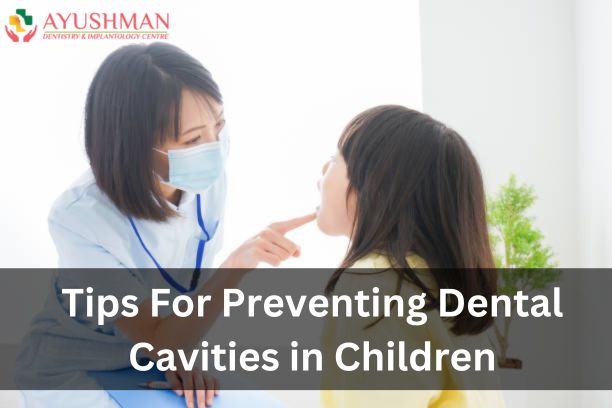Tips For Preventing Dental Cavities in Children

Tips For Preventing Dental Cavities in Children
As parents, we want to give our children the best start in life, and that includes their dental health. Preventing dental cavities in children is not only essential for their oral health but also for their overall well-being. Tooth decay can lead to pain, infection, and even difficulty eating and speaking. Fortunately, there are simple yet effective steps parents can take to safeguard their children’s smiles. In this blog, we’ll delve into successful approaches for safeguarding children against dental cavities, guaranteeing the durability and cavity-free nature of their teeth.
10 Tips for Preventing Dental Cavities in Children
Emphasize Routine Dental Care:
Preventing dental cavities in children is establishing a robust routine of dental care. Encouraging children to grasp the importance of maintaining good oral hygiene practices is paramount. Emphasize the necessity of brushing teeth at least twice a day and flossing once daily. By instilling these habits from an early age, we lay the foundation for a lifetime of healthy dental practices, effectively reducing the risk of cavities.
Avoid Sharing Food and Beverages:
Children often engage in the innocent act of sharing food and beverages with friends and family. However, this practice can inadvertently lead to the transmission of oral bacteria, increasing the likelihood of cavities. Educate children about the risks associated with sharing utensils, cups, or food items. By encouraging them not to share, we minimize the spread of harmful bacteria that contribute to cavity formation.
Prioritize Regular Dental Check-ups:
Regular dental check-ups are essential for monitoring oral health and detecting any early signs of cavities. Initiate dental visits for your child as soon as their first tooth erupts, and maintain biannual visits thereafter. During these visits, dentists can provide preventive interventions such as fluoride treatments or dental sealants, further reducing the risk of cavities.
Limit Sugary and Starchy Foods:
The consumption of sugary and starchy foods significantly contributes to the formation of plaque, which erodes tooth enamel and promotes cavity formation. It’s crucial to limit your child’s intake of these foods and encourage healthier alternatives like fruits, vegetables, and water. Additionally, promote brushing after every meal or snack to remove food particles and minimize the risk of cavities.
Increase Intake of Water-Dense Fruits and Vegetables:
Incorporating water-dense fruits and vegetables into your child’s diet offers numerous benefits for dental health. These foods help maintain hydration in the mouth and stimulate saliva production, which aids in rinsing away food debris and inhibiting bacterial growth on the teeth.
Reduce Sugary Beverage Consumption:
Sugary beverages such as soda and juice drinks are major contributors to tooth decay. Discourage their consumption and instead promote water as the primary beverage choice. Water not only hydrates but also helps flush bacteria from the mouth, reducing the risk of cavities. Opt for fluoridated tap water when available, as fluoride strengthens tooth enamel and provides additional protection against cavities.
Consider Dental Sealants:
Dental sealants offer an additional layer of protection against cavities by sealing off cracks and spaces where bacteria can accumulate. Consult your family dentist about the possibility of applying dental sealants to your child’s teeth. This proactive measure can provide years of cavity prevention and peace of mind.
Promote Adequate Water Consumption:
Encouraging your child to drink plenty of water throughout the day is crucial for maintaining optimal oral health. Water helps maintain saliva production, which plays a vital role in neutralizing acids in the mouth and preventing the buildup of plaque. Fluoridated water, in particular, offers additional benefits in strengthening tooth enamel and reducing cavity risk.
Avoid Sticky Foods:
Sticky foods such as honey, caramel, and taffy pose a significant risk to dental health as they adhere to the teeth, creating an environment conducive to bacterial growth and acid formation. Limit the consumption of these foods to reduce the likelihood of cavity development, as they are challenging to remove through brushing alone.
Incorporate Acid-Fighting Foods:
Integrating acid-fighting foods like cheese and nuts into your child’s diet can contribute to their dental health. Cheese is rich in calcium and phosphates, aiding in the remineralization of tooth enamel and balancing mouth acidity. Similarly, nuts stimulate saliva production and contain essential minerals that promote dental health.
Conclusion
Preventing dental cavities in children requires a comprehensive approach encompassing education, healthy dietary choices, diligent oral hygiene practices, and regular dental care. By implementing these ten detailed recommendations from expert family dentists, parents can effectively reduce the risk of cavities and promote optimal oral health for their children. Investing in preventive measures early on not only prevents the discomfort associated with cavities but also sets the foundation for a lifetime of healthy smiles.









